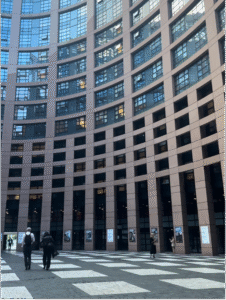16-year-old Irma reflects on her month-long internship at the European Parliament and Gen Z’s growing distrust of politics

Budapest mayor Gergely Karácsony at a Green Party meeting in the European Parliament.
Picture by: Irma Mecele
Article link copied.
14 November 2025
Europe’s politics runs on words, not action: I saw it first-hand

Politics is highly performative: some speak with passion but say almost nothing, others sound like they have stopped caring. I realised this during my one-month internship at the European Parliament, sitting through long meetings between party members and committees.
That experience gave me a glimpse behind the scenes and helped me understand why my generation struggles to believe in politics.
Harbingers’ Weekly Brief
Inside Parliament
During my internship, I shadowed one particular MEP – following him to meetings, votes and media appearances. I took notes, helped manage his social media accounts and newsletter, and prepared short briefings before interviews.
Since I was there during the quieter summer months, I had time to actually observe. I saw what politics really looks like behind the speeches, votes and headlines.
The European Parliament is the directly elected legislative assembly for the European Union. It currently has 720 MEPs (Member of the European Parliament), voted for every five years. It has parliament buildings in two main locations – Brussels and Strasbourg – and also offices in Luxembourg.
I visited both parliaments and, honestly, having two seems inefficient and unnecessary. Travelling back and forth every month is expensive and environmentally damaging. But France will not let it go – mostly because Strasbourg’s economy depends on it – and partly because of what the city symbolises: peace and unity after World War II.
One thing that really stood out to me was how many issues politicians are expected to comprehend every day. It is overwhelming. To be a good politician, you need to grasp everything, from trade to climate to health, and truly understand the committees you are responsible for within your party. In that sense, tools such as ChatGPT can help – having quick access to information before an interview can make a huge difference.
But relying too much on AI or staffers is risky. If politicians do not truly understand what they are talking about, why should we trust them? I would rather hear from experts and scientists who live and breathe their subjects. Politicians are vital for making laws, but we should not forget the value of expertise.
Why my generation is losing faith
After weeks of watching debates and media briefings, I began to understand why so many young people feel alienated from this system. For many in my generation, politics feels like an outdated system – slow and disconnected.
There is a stereotype that politics ‘belongs’ to older people and that our generation is too emotional to ‘truly understand’ it.
There is also another stereotype that young people today do not care about politics, but the truth is, we are tired of seeing politicians make promises they never keep.
During my internship, I noticed how powerful confidence can be. Politicians who spoke with confidence and conviction gave me hope. But that feeling faded fast after I realised how performative it all was. Politics started to look more like a talk show: lots of talk, very little action.
It is no wonder that so many young people are losing faith in politics. A Cambridge University study from 2023 found that young people feel misrepresented in politics, causing them to feel alienated and disengaged. We crave authenticity and a need to be represented. Yet, the average age of an MEP is 50; a quarter of MEPs are over 60, and only 6% are under 35.
When politics is led mostly by people who don’t share our experiences or concerns, it risks losing our hope and attention. We need energetic, fresh perspectives at the table when decisions are being made.
If we want a future that is sustainable and inclusive, we need the views of younger generations in the room.
Bureaucracy often kills motivation – EU regulations can take anywhere from two months to more than 13 years to pass. By the time change arrives, the passion that started it has gone.
How politics can win us back
To shape the future, young people need to understand and engage with politics, but that system has to listen and include us in the process.
Start with education. Schools should teach politics, encourage debate and show students how decisions shape their lives. When young people understand the system, they care more about protecting their beliefs.
Simplify the language. Political jargon alienates people. The far right knows this – its messages are short, emotional and clear. If mainstream politicians spoke as plainly, more citizens would listen.
Make it relevant. Experts, journalists and politicians should explain how policies affect real lives and do it on platforms where young people actually are.
Also, please, move faster. Stop debating 2030 or 2050 targets while the planet burns in 2025.
Simplify the language. Political jargon alienates people. The far right knows this – its messages are short, emotional and clear. If mainstream politicians spoke as plainly, more citizens would listen.
Make it relevant. Experts, journalists and politicians should explain how policies affect real lives and do it on platforms where young people actually are.
Also, please, move faster. Stop debating 2030 or 2050 targets while the planet burns in 2025.
Finally, transparency matters. Citizens should know where their tax money goes and how decisions are made. Trust is built not with speeches but with clarity.
In the European Parliament, I saw how easy it is to speak without saying much. My generation does not have the luxury – our future depends on what our leaders choose to do right now. We don’t have time to waste on empty words when action is what’s needed.
Written by:

International Affairs Correspondent
Vilnius, Lithuania
Born in 2009 in London, UK, Irma studies in Vilnius, Lithuania. She is interested in history, politics and the environment, and plans to study economics. For Harbingers’ Magazine, she writes about politics, culture and society.
In her free time, Irma plays tennis, piano and other sports like karate and boxing. She also enjoys learning languages, travelling and singing. She is proud of finishing a Columbia University program, completing an internship at the EU and taking part in the ‘Voice Kids of Spain’.
Irma speaks Russian, English, Spanish and studies French and Lithuanian.
Edited by:

🌍 Join the World's Youngest Newsroom—Create a Free Account
Sign up to save your favourite articles, get personalised recommendations, and stay informed about stories that Gen Z worldwide actually care about. Plus, subscribe to our newsletter for the latest stories delivered straight to your inbox. 📲
© 2026 The Oxford School for the Future



